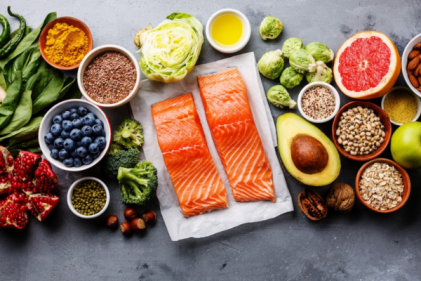
Our menstrual cycle is so important for our overall health, not only from a fertility point of view but also due to the impact of our sex hormones on our bones, our skin and our mood, to name but a few. There are a number of different factors that can result in an absent menstrual cycle; these include very low body weight, stress, PCOS and a lack of ovarian activity after coming off the Pill.
The first step is always to ensure there is no underlying condition preventing the ovaries from working properly. If the ovaries look normal at an ultrasound, and all other medical checks are normal (for example, your hormone levels are within the normal ranges), then natural remedies can be enormously effective in kick-starting the ovaries back into action.
Here are the top five tips to helping you get your menstrual cycle back on track:
1. Nourish your body
It is extremely important that you have a good, healthy diet. Your body needs to be well nourished in order to function normally and to encourage regular menstrual cycles. You need to have a good variety of food. Do not restrict your diet to just a few food choices; the more variety you have, the more likely to are going to get a good range of nutrients. Include grains, beans, vegetables, fruit, nuts, seeds and, most importantly, oily fish such as salmon, trout, mackerel and sardines.
2. Correct any vitamin and mineral deficiencies
Use of the Pill may have upset your intake of nutrients, especially B2, B6, B12 and also folic acid. The Pill can also upset the balance of copper and zinc in your body, leaving you with too much copper and not enough zinc. This imbalance can still exist even if it has been some time since you took the Pill regularly. Zinc is crucial for the healthy functioning of your reproductive system and is found in prawns and oysters, wheat germ, oats, and corn, pumpkin, sunflower and sesame seeds, almonds, pecans, walnuts, Brazil nuts, mung beans and alfalfa. Taking a good quality nutritional supplement, such as NHP Healthy Woman, can provide the nutrients your body needs to get itself back into optimum health, and add back those nutrients that are important for the normal functioning of your reproductive system.
3. Introduce some calm in your life
Look at your lifestyle to assess what you can do to alleviate stress levels, if this is a factor. Stress, which causes adrenaline to be released, can be the product of outside pressures in your life. It can also, however, be caused by internal stress caused by demands placed upon your body. What you eat and drink can make a difference to how much adrenaline is surging around your body. The most important dietary action is to avoid sugar, refined foods, caffeine and alcohol. From a lifestyle point of view, consider meditation, mindfulness, yoga or pilates. Siberian ginseng (Eleutherococcus senticosus) is also a very useful herb, if you think your amenorrhea is caused by stress. It has the ability to support your body where it needs it most, and not only to help boost your energy but also help you cope better with stress.
4. Watch your BMI
Aim to reach your natural weight, whether you are under- or overweight whether through dietary and/or changes to your intensity of physical activity. Variations in weight can have a massive effect on your menstrual cycle, so aiming to be within, or as near as possible to the normal BMI range of 20-25 is very important.
5. Look at herbal tinctures
Agnus Castus is very much the herb of choice when trying to bring back periods. It works on the pituitary gland by balancing the levels of FSH (follicle-stimulating hormone) and LH (luteinizing hormone), which then sends a message to the ovaries. The result is that progesterone levels go up and your cycle should kick back into action. This can take between three and six months. Please be aware that herbal medicine cannot be taken in conjunction with many other medications - we recommend getting advice from qualified practitioners.
Because of the complex nature of female hormones, it’s always worthwhile coming to talk to us about your individual case. With a number of nutritionists based in Dublin, Galway and Cork, we have very extensive experience in dealing with and supporting this condition, as well as other female hormone issues. Log onto www.glenvillenutrition.ie for more information, or contact us on (01) 402 0777.








